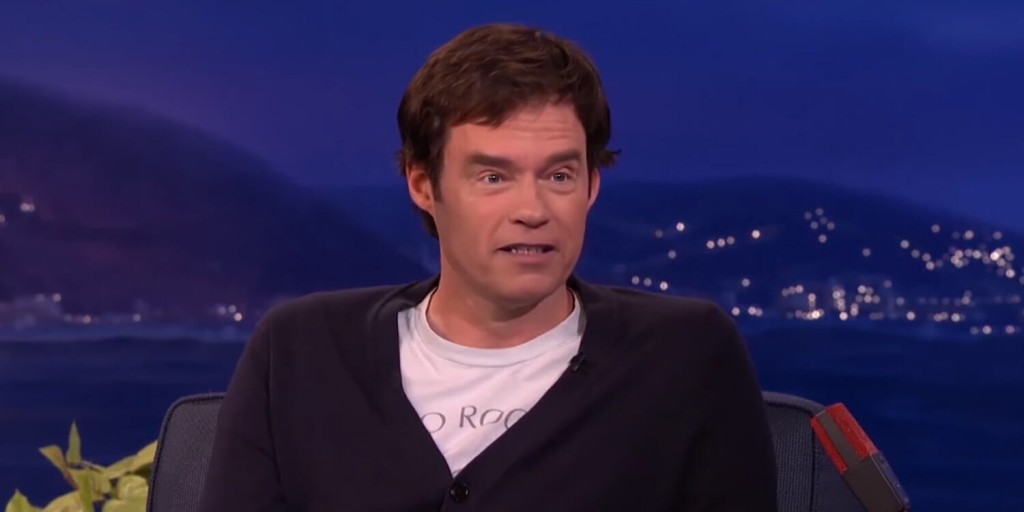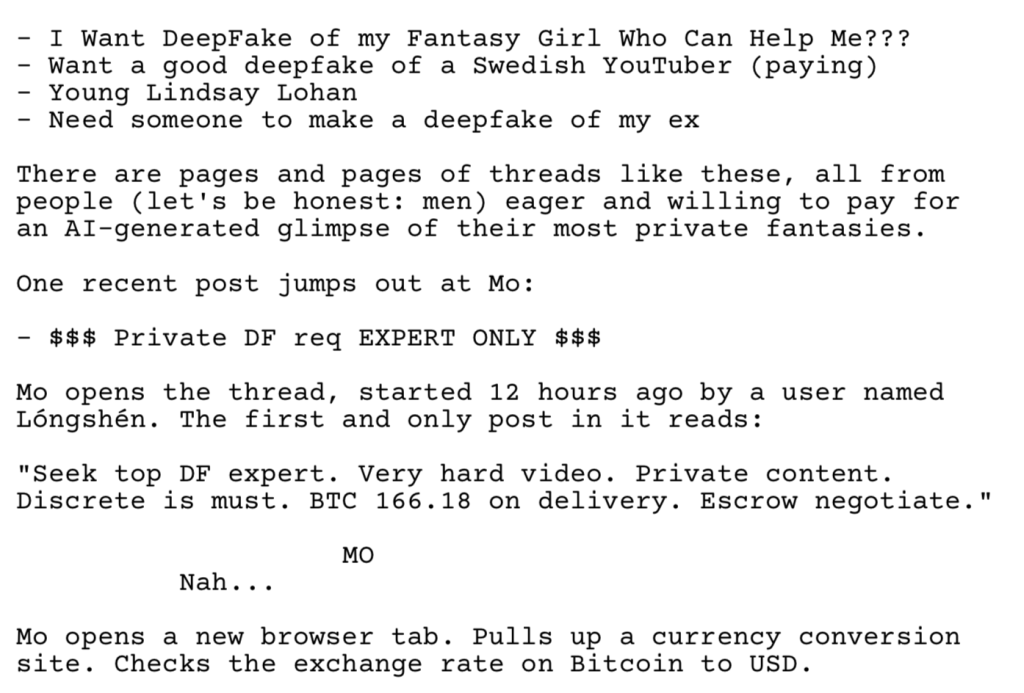Genre: Thriller
Premise: A film school dropout with a talent for producing AI-generated “deepfake” videos is caught in a global conspiracy when he receives a disturbing commission from a mysterious online stranger.
Why You Should Read: If you haven’t yet seen deepfakes in the news, you will. This emerging AI-powered technology lets anyone with an average gaming PC churn out eerily lifelike fake videos of people. The social and political implications of this technology are huge, and it has politicians, generals, artists, and celebrities freaking out. Someone is going to make a movie about deepfakes. I hope it’s this one, and I think my background in tech makes for a story that’s plausible and well-researched while still being thrilling, unpredictable, and character-driven.
Writer: Alex Payne
Details: 115 pages
I’ve always said that the only original stories left to tell are the ones that incorporate new technology. I mean, do you really think you’re going to find some new angle on the zombie genre? Or the romantic comedy? Or an action-adventure? Or biopic? People have been telling these stories for decades – arguably centuries. Which means high-profile technology that nobody expected to exist (because if it did, it would’ve already been written about) is the last opportunity to write something fresh (incidentally, this is why “voice” is valued so highly in the industry. With every story already being told, the only way to make a story stand out is via the unique way in which its told). However, just because you’re writing about something new doesn’t mean you can’t descend into tired storytelling tropes. That’s what I’m always worried about when I see a script like this. Is the flashy subject matter a smokescreen for what’s going to be a traditional thriller? I hope not!
22 year old Mo James is essentially squatting in a New York City apartment, promising his friend of a friend landlord that he knows he’s missed the rent the last three months but he promises he’ll have the money soon. Mo’s not the only one in his family having money problems. His once successful father is about to lose his home and business if he doesn’t come into some dough fast.
Mo heads to the dark web hoping to find a job that will pay for all this. Oh yeah, Mo is a deep faker. He takes home porno videos and fits celebrity heads on the girls’ bodies. There ain’t enough money in it for a New York City lifestyle, though, so Mo is desperate to find something that pays more. That’s when he comes across a 1.3 million dollar deep fake job. He thinks it’s fake, but after a little research, he learns the client is legit.
Mo accepts the job but when he receives the video, he realizes why it pays so much. In it, a militant Asian woman is speaking to an entire crowd of people, trying to rile them up. Mo’s job is to deepfake every single face in the crowd! There’s no way he’s going to be able to pull this off by himself, so he contacts his sister who has a relationship with a high profile transgendered hacker named Darby. Darby thinks what Mo does for a living is disgusting but decides to help him anyway.
As Darby tries to solve the mass-deepfaking algorithm, he becomes curious who hired Mo and suggests they find out. This leads the two on a wild goose chase around town as they track down remote computer servers connected to other remote computer servers that connect back to where the client actually lives. Of course, when the client finds out that they’re snooping, they try to kill Mo and Darby. It will now be up to them to expose the bad guys before they perish under mysterious circumstances.
I can see why this script won Amateur Showdown last week.
It has a really strong first 10 pages, which is what most voters base their vote on. If I would’ve read the first 10, I would’ve voted on Deepfake as well. What’s most impressive is the knowledge the writer has, not just in regards to this subject matter, but with computers in general.
However, little red flags began popping up that the strong start would be temporary. And I want to make clear that I’m not out there actively searching for these flags. They pop up subconsciously. I’ve read so many scripts at this point and have become so aware of patterns that when they happen, a natural, “uh oh, I’ve been here before” warning pops into my brain, like a low altitude warning on a jetliner.
The first flag is that everybody in this script is 23 years old (or 21, or 22, or 24). Why is this a flag? Because, in my experience, it means that’s how old the writer is. And while 23 year old writers can be extremely talented, they haven’t failed through enough screenplay experiences yet to truly understand what works and what doesn’t. More specially, they’re weak with structure and struggle mightily with second acts.
On top of this, while their voice can be exceptional, they often don’t have the life experience to convincingly portray grown-uphood. And this won’t matter as much if you’re writing, say, a romantic comedy about two 23 year olds. But when you’re bringing in giant organizations and global firms and military stuff and the real job world, a lot of young writers don’t know that world well, which results in them, well, ’deepfaking’ them (using approximations based on previous movies and TV shows they’ve seen). You can feel that as a reader. It’s no different than George Lucas writing about love. Him not knowing that world is why we get Anakin and Padme rolling around in waterfalls in Attack of the Clones.
Indeed, those are the two main problems here. On the structural front, the second act gets messier and messier. It feels like the characters are running around with their heads cut off. It feels like the story is running around with its head cut off. It feels like the writer is struggling to keep this thing on the rails. Half the time, I didn’t even know what Mo and Darby were trying to do! It seemed like they wanted to find out who the client was, but all I kept thinking was, “Why??” Cause they’re curious? Should 50 pages of a script be driven by two characters’ curiosity?
And then there was the video itself. The writer never gave us a convincing reason to care about this militant woman talking to a group of admirers. In fact, I still don’t know what the point of deepfaking the crowd was. In the end, the video’s lack of substance was confirmed when we were told it was some random terrorist in some random part of the world attempting to do some vague “bad” thing. Here’s a question writers need to ask more often. Why should we care? Why in the world do I, the reader, care that some fringe terrorist group is going to do some fringe terrorist act 10,000 miles away from my existence? Change number one for this script needs to be to tie it in to where our characters are actually located. The terrorist act needs to affect New York.
I hate to pile on, but every 10 pages was worse than the previous 10 pages. And that happens A LOT(!!!) with young writers. They nail the first act and then they give what they feel is a decent exploration of the idea going forward. DECENT ISN’T GOOD ENOUGH. Let me give you an example. Late in the script, Darby and Mo get into a fight about Mo’s deepfaking job, specifically the fact that he’s taking these girls and putting celebrity heads on them. “Do you get their consent!?” he hells at Mo. “Do you get their consent!?” It’s not that Darby’s concerns aren’t valid. But this isn’t what the story is about!!! It wasn’t about how Mo deepfaked an innocent girl and the rest of the movie is the fallout from that situation. They’re battling an organization that sends out drones that fire missiles at them! Who cares about the moral consequences of what Mo does at this point? You have to understand your theme and what you’re actually trying to say when you’re writing scenes like this. Otherwise, it feels like a grab bag of drama, a writer desperately looking for any conflict he can latch onto.
Personally, I think Alex approached this story from the wrong angle. Late in the script, Mo threatens to frame a journalist he dislikes by deepfaking their face onto an incriminating video. “That’s not me,” the journalist says. “I’ll prove it’s fake. I’m a reporter. People trust us.” That should’ve been your theme. Fake news. Journalists using this deepfake technology to back up their own narratives. Have a journalist hire Mo to deepfake a video that ends up going viral and changing the political landscape of the country. Sort of like the next step up from what Louis Bloom was doing in Nightcrawler. I don’t see how anyone’s going to get excited about a deepfake story that’s centered around an unknown province in India.
Script link: Deepfake
[ ] What the hell did I just read?
[x] wasn’t for me
[ ] worth the read
[ ] impressive
[ ] genius
What I learned: Last Second Villain Syndrome never works – We literally meet our villain in the final scene of the script. Come on! You either have to introduce the villain earlier or one of your good characters has to turn.
What I learned 2: Make things hard for your hero. Not easy. Especially when it comes to stakes. Mo’s landlord is a friend of a friend who’s SUPER understanding that Mo is late with his rent. That’s not interesting at all. Make it someone Mo doesn’t know. Make him scarier. And make him demand money now, not whenever it’s convenient.



